|
Momentum Newsletter
In the last issue of Momentum, I shared some of the exciting initiatives that Lehman’s academic and administrative divisions have undertaken to boost student success. In this issue, I want to focus on the innovative work being done to leverage the latest technologies to ensure our students thrive in school and continue to succeed after graduation.
Updated Tools for Student Success
A Communication and Information Hub
Lehman 360, the award-winning platform designed with and for students, faculty, and staff, created the groundwork for further innovation in student-centered technology at the College. Implemented in late 2017, Lehman 360 supports the vital work being done across the college to promote student retention and success.
For students, Lehman 360 offers a bundle of resources designed to make their college experience more convenient, accessible, and successful. The platform facilitates access to Blackboard, CUNYfirst, and other systems that students make use of throughout the semester. It can even be customized to include access to social media sites and news feeds. The dashboard provides visualizations of student information, such as grades and academic progress. It will also enable faculty and advisors to interact with students—notifying them of scholarship opportunities or alerting them to seek academic support. There is a module for reviewing the Student Evaluation of Teaching and Learning course surveys that are conducted at the conclusion of each semester.
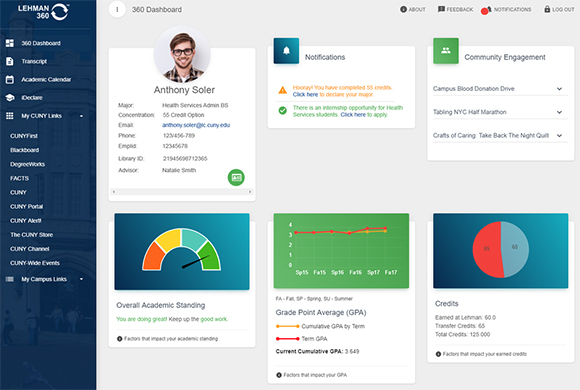 Lehman 360 Lehman 360
Faculty members and advisors can also use the 360 platform to communicate about a students’ needs with other college entities such as the Office of Financial Aid, counseling services, or instructional support. Soon, Degree Works—another tool for students, faculty, and advisors to monitor academic progress toward a degree—will be accessible through Lehman360. Degree Works displays a student’s progress toward graduation. Courses from the student’s transcript are organized in a way that makes clear which course requirements are completed and which still need to be met.
Studies show that students who feel connected to their academic community do better in school. One way to foster connection is through gamification of the Lehman 360 dashboard. Gamification is a strategy to motivate user engagement by integrating game-like elements—including “points”—into an activity or task. The goal is to encourage routine use of Lehman 360 and acknowledge students for participation in curricular and extracurricular activities—such as attending a Student Life event. This new feature is in the planning and development stages.
Visualizing Student Achievement
Through student engagement activities and extra-curricular learning opportunities, Lehman students will acquire critical knowledge and skills over the course of their academic career. These achievements should be recognized, yet they often don’t fit into standard assessment rubrics like credits and grades. One way to make this type of rigorous learning visible is through micro-credentials, also known as digital badges. Badges represent specific skills or competencies, and are used by many organizations and employers as verifiable evidence of achievement and talent. A student may post badges on social media profiles and digital resume; they are especially relevant for career-oriented sites like LinkedIn. Lehman currently offers badges for achievements that include Presidential Scholars and Dean’s List Recipients, completion of the Library’s Bloomberg Market Concepts courses, the AR/VR Innovation Academy’s Level 1 course, and Small Business Development Center training and internships. Additional badges are in development.
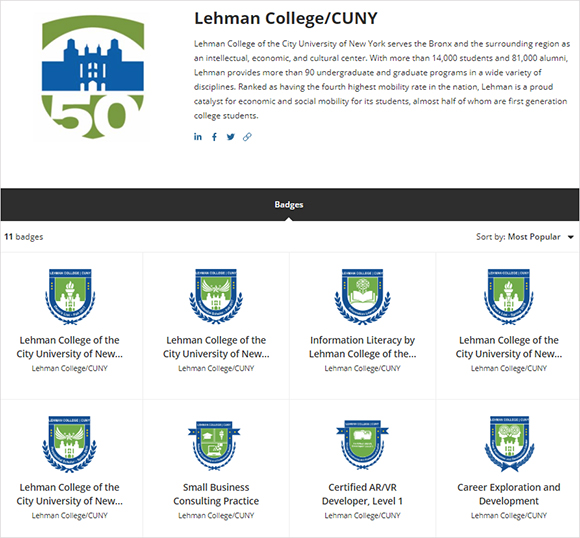 Digital Badges Digital Badges
To make the path toward a college degree more visible, we will be updating and expanding online degree maps. Degree maps are diagrams of four-year academic plans for undergraduates. Last year, these were piloted for a selection of majors on Lehman’s academic programs web page; soon maps will be available for all undergraduate degrees. Degree maps provide clear information about the course requirements for a bachelor’s degree in different majors—indicating which courses have been completed, which courses should be taken next, and when to enroll. The maps were developed to make students’ progress toward a degree as transparent as possible to them, while ensuring that they receive a well-rounded education along the way. Eventually degree maps will include interactive components that allow students to explore specific components of their academic plan in more detail.
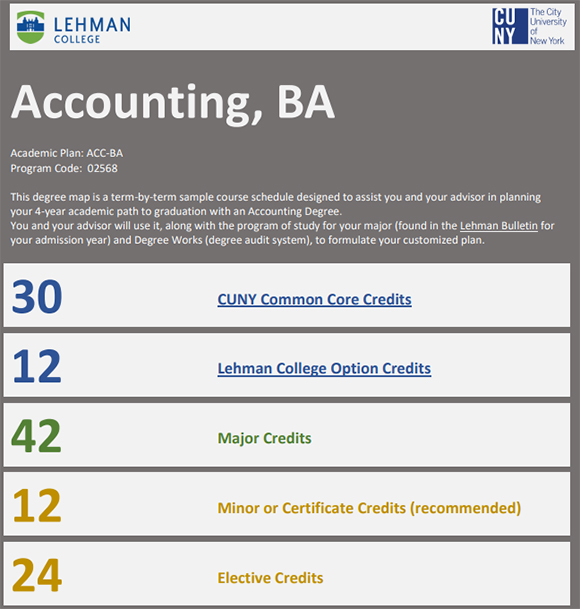 Online Accounting, BA Degree Map Online Accounting, BA Degree Map
Time-Saving Tools
Time is a precious commodity for all of us. Three systems currently in place make navigating Lehman—academically and logistically—faster and more convenient. Students preparing to declare their major may now take advantage of the iDeclare system. This efficient tool enables students to declare, or request changes to their major, through a web interface—reducing trips to advisors and to the Registrar’s Office. Another time-saving tool is helping students schedule important appointments. LehmanQ, a digital appointment scheduling/queue management system, reduces wait times at the Financial Aid and Bursar’s offices, as well as at the IT Help Desk in Carman Hall. By joining virtual queues online via their mobile phones or at an on-site kiosk, students receive status alerts and reminders before designated appointment times. We plan to expand system to other high-traffic administrative offices as well as academic departments. With LehmanQ, students can use the time they would have spent waiting for more productive activities around campus. Now they also have easier access to Lehman facilities with mobile phone-based digital ID cards. The IDs (currently available to students only) can be scanned straight from the device for entrance to the library, the IT Open Center, the Campus Life building, APEX, and the Multimedia Center. The digital IDs include a date and time stamp for added security. Students may obtain a digital ID through Lehman 360 via the Lehman College mobile app (available on the App Store or on Google Play).
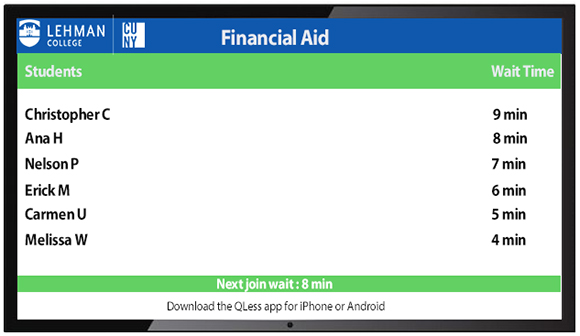 LehmanQ LehmanQ
Another efficient technology planned to enhance Lehman’s online presence will be the pilot of an artificial intelligence- or AI-powered chatbot. The chatbot will enable students (as well as faculty and staff) to get important information 24/7 through a chat-based conversation—no more searching. In its initial implementation, the bot will provide information such as office hours, room locations, and event times, etc. Soon, it will have access to the same information found in Lehman 360. The result will be a robust search tool capable of retrieving specific information. We expect to introduce the chatbot feature next year.
Updated Technology to Expand Institutional Capacity
Expanding the Network
To accommodate increased demand, the college continues to add wireless access points in classrooms, offices, campus tunnels, and other areas, boosting signal visibility and improving network performance for our community. Along with improved Wi-Fi, we have plans to modernize classroom technology across the College. Networked classrooms facilitate the use of digital course materials, increase opportunities for distance learning, and make it possible for students and teachers to collaborate in class. Smart classrooms are also equipped with computers and device outlets, digital projectors, and retractable screens.
Technology in the Classroom
The School of Continuing and Professional Studies’ Augmented & Virtual Reality Academy and Development Lab has produced award-winning graduates. But students don’t need to participate in the academy to benefit from immersive augmented reality (AR) and virtual reality (VR) technology. The Herbert H. Lehman Center for Student Leadership Development has been offering public speaking workshops utilizing VR goggles, to help students practice presentation and job interview skills in simulated conference rooms and classrooms. AR and VR technologies are on the leading edge of interactive teaching and learning, and we are on the lookout for opportunities to implement these innovative methods in the classroom.
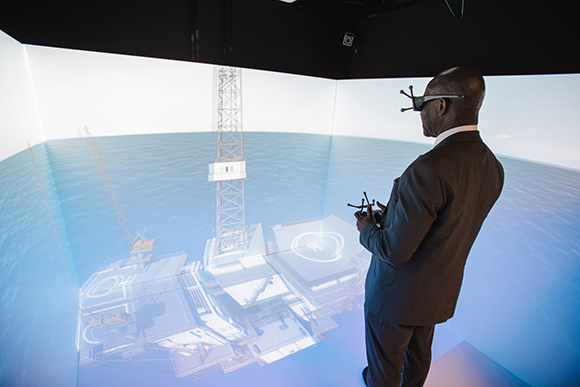 Augmented & Virtual Reality Academy and Development Lab Augmented & Virtual Reality Academy and Development Lab
The iClicker, a classroom teaching tool already in use, is being adopted by increasing numbers of Lehman faculty. Resembling a TV remote, it is used in conjunction with the flipped classroom model, in which lectures and readings are accessed online asynchronously (outside of class), while classroom sessions are used for interactive learning. Students use the iClickers to engage in activities such as polls, quizzes, and feedback on course materials, and have more time for group discussion. The flipped classroom has demonstrated a profound effect on student success: when it was first implemented in a course section of general chemistry, passing rates jumped by half, to 75%. The model has since been adapted to other courses and disciplines.
Most classrooms on campus utilize some form of technology. Each of these spaces contributes to Lehman’s dynamic educational environment. They work because of our committed faculty and motivated students. Most importantly, the increase in student engagement directly translates to academic success.
CUNYsmart
The CUNYsmart platform is an administrative resource for Graduation Specialists and advisement staff. Lehman collaborated with CUNY Central to pilot a student success dashboard (SSD) component. This provides access to data from the Office of Institutional Research, such as cohort information; CUNYfirst; and DegreeWorks. In a few minutes, the tool can retrieve information that previously took hours of research, working with multiple systems, to compile. The impetus for the SSD was Lehman’s need for additional tools that facilitate data-driven decision making in enrollment management. The SSD platform in CUNYsmart has been rolled out to Bronx Community College and the CUNY central administration, and is expected to expand to other CUNY colleges.

We will continue to explore ways that technology can enhance the success of students, faculty, and staff, and make more efficient the complex systems that operate behind the scenes to sustain the mission of Lehman College.
Sincerely,
José Luis Cruz
@LehmanPresident
Previous messages from President Cruz can be found here. |